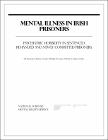| dc.contributor.author | KENNEDY, HARRY | |
| dc.date.accessioned | 2012-06-21T15:17:54Z | |
| dc.date.available | 2012-06-21T15:17:54Z | |
| dc.date.created | December | en |
| dc.date.issued | 2004-12 | |
| dc.date.submitted | 2004 | en |
| dc.identifier.citation | Harry G Kennedy, Stephen Monks, Katherine Curtin, Brenda Wright, Sally Linehan, Dearbhla Duffy, Conor Teljeur, Alan Kelly, Mental Illness in Irish Prisoners, Dublin, National Forensic Mental Health Service, Dundrum, Dublin 14, Ireland, December, 2004 | en |
| dc.identifier.other | Y | |
| dc.identifier.uri | http://hdl.handle.net/2262/63924 | |
| dc.description | PUBLISHED | en |
| dc.description.abstract | This is the first systematic and representative survey of psychiatric morbidity in the Irish Prison population, using standardised research diagnostic methods. Five samples have been compiled, including 7% of all men committed to prison in 2003, 50% of all men in custody on remand, 15% of all sentenced men, 9% of all women committed to prison in 2003 and 90% of all women in prison. A total of 1,396 men and 186 women, 1,582 in all. Samples were closely representative of the total populations from which they were drawn. We also mapped the geographic origins of all those committed to prison over a twelve-month period.
We found that drugs and alcohol dependence and harmful use were by far the most common problems, present in between 61% and 79% of prisoners. Typically, prisoners were using multiple intoxicants, including alcohol, benzodiazepines, opiates, cannabis and stimulants. For all mental illnesses combined, rates ranged from 16% of male committals to 27% of sentenced men, while in women committed to prison the rate was 41%, with 60% of sentenced women having a mental illness. For the more severe mental illnesses, rates of psychosis were 3.7% amongst men committed to prison, 7.6% amongst men on remand and 2.6% amongst sentenced men. Women prisoners had psychosis in 5.4%. The rate of psychosis in remand prisoners is much higher than in comparable samples from abroad. Depressive disorder was present in 10% of male prisoners and 20% of female prisoners. Most prisoners with mental illness including psychoses, had co-morbid drugs and alcohol problems.
We estimated that 3.7% of male committals, 7.5% of men on remand, 2.6% of sentenced men and 5.4% of female prisoners should be diverted to psychiatric services, while as many as 20% of male committals and 32% of female committals needed to be seen by a psychiatrist. This would require approximately 376 transfers from prison to hospital per annum, and between 122 and 157 extra secure psychiatric beds, in addition to extra mental health in-reach clinics. Drug and alcohol problems are so pervasive that traditional `clinic? models of service are unlikely to provide the best solution for most in prison. A generalised strategy which favours drug-free status and motivates inmates could have a significant impact on drug-subcultures in prisons and nationally.
Mapping the geographic origins of prisoners showed that urban districts with high deprivation scores were over-represented, though rural deprived districts did not have the same problem. Dublin accounted for 41% of prison committals, compared to 31% expected for it?s population. | en |
| dc.description.sponsorship | East Coast Area Health Board and Irish Prison Service. | en |
| dc.format.extent | 1-108 | en |
| dc.language.iso | en | en |
| dc.publisher | National Forensic Mental Health Service, Dundrum, Dublin 14, Ireland | en |
| dc.rights | Y | en |
| dc.subject | forensic | en |
| dc.subject | mental health | en |
| dc.subject | psychiatric morbidity | en |
| dc.subject | prisoner | en |
| dc.subject | epidemiology | en |
| dc.title | Mental Illness in Irish Prisoners | en |
| dc.type | Report | en |
| dc.type.supercollection | scholarly_publications | en |
| dc.type.supercollection | refereed_publications | en |
| dc.identifier.peoplefinderurl | http://people.tcd.ie/kennedh | |
| dc.identifier.rssinternalid | 77405 | |




